Colleen Cross's Blog, page 11
January 3, 2012
Fraud and the Financial Crisis
The 2008 financial crisis of brought a lot of fraud out of the woodwork, and there will be more. Are there more frauds today than ever before? Probably not. Dire economic circumstances are simply flushing them out.
One surefire way of uncovering fraud is to ask for your money back. Many people redeemed their investments with the economic downturn, forcing the fraudster's hand. Most ponzi schemes collapse for the simple reason that redemption requests exceed the money on hand in the investment fund. The fraudster is confronted, but of course has spent or diverted the money, and is unable to give it back.
When times are good, people are unlikely to need their money, so it just sits in the investment fund. At least that's where the investor thinks it is. In addition, the fraudster promises much higher (fictitious) returns than anywhere else, making for happy investors. Happy investors don't ask as many questions. And they don't move their money out either.
The reason the fraudster's investment is able to pay such good returns is that he or she is simply paying the outgoing investors with the new investors' funds. No problem, unless more people want out than in. In an economic downturn, not only do some people need their money out, but there are also fewer new investors.
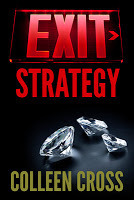 I'm guessing there are still more massive frauds to be uncovered in the next few years. In the meantime, remember these tips:
I'm guessing there are still more massive frauds to be uncovered in the next few years. In the meantime, remember these tips:
If something seems to good to be true, it probably is.If you don't understand, don't invest. Period.Beware of time-sensitive investments. A sense of urgency is a major red-flagRead everything before investing your hard-earned cash.Ensure there are audited financial statements from a well-known, reputable accountant.Read Colleen Cross's financial thriller, Exit Strategy, available on Amazon: http://ow.ly/87aR7 and other online book retailers
One surefire way of uncovering fraud is to ask for your money back. Many people redeemed their investments with the economic downturn, forcing the fraudster's hand. Most ponzi schemes collapse for the simple reason that redemption requests exceed the money on hand in the investment fund. The fraudster is confronted, but of course has spent or diverted the money, and is unable to give it back.
When times are good, people are unlikely to need their money, so it just sits in the investment fund. At least that's where the investor thinks it is. In addition, the fraudster promises much higher (fictitious) returns than anywhere else, making for happy investors. Happy investors don't ask as many questions. And they don't move their money out either.
The reason the fraudster's investment is able to pay such good returns is that he or she is simply paying the outgoing investors with the new investors' funds. No problem, unless more people want out than in. In an economic downturn, not only do some people need their money out, but there are also fewer new investors.
 I'm guessing there are still more massive frauds to be uncovered in the next few years. In the meantime, remember these tips:
I'm guessing there are still more massive frauds to be uncovered in the next few years. In the meantime, remember these tips:If something seems to good to be true, it probably is.If you don't understand, don't invest. Period.Beware of time-sensitive investments. A sense of urgency is a major red-flagRead everything before investing your hard-earned cash.Ensure there are audited financial statements from a well-known, reputable accountant.Read Colleen Cross's financial thriller, Exit Strategy, available on Amazon: http://ow.ly/87aR7 and other online book retailers
Published on January 03, 2012 16:12
December 30, 2011
Lies, Damned Lies and Crime Statistics
 As 2011 draws to a close, law enforcement agencies will soon be publishing crime statistics. In recent years we have seen downward trends for many crimes. Police agencies are quick to note the positive impact of more effective policing and crime prevention tactics. This is true. Improved tools, technology and investigative techniques do play a major role, as does an aging population. But, as with any statistics, there is always more to the story.
As 2011 draws to a close, law enforcement agencies will soon be publishing crime statistics. In recent years we have seen downward trends for many crimes. Police agencies are quick to note the positive impact of more effective policing and crime prevention tactics. This is true. Improved tools, technology and investigative techniques do play a major role, as does an aging population. But, as with any statistics, there is always more to the story.Technology is a double-edged sword. It plays a major role not only in solving crime, but also in creating new crimes that never existed before. A paradigm shift is occurring. Identity theft, embezzlement and fraud are ever-increasing crimes that offer a better risk-reward factor to enterprising criminals. Are these new crimes effectively captured in the new statistics, and if so, are they counted the same way?
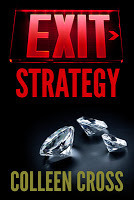 For instance, an "old school" thief might break into a house, or more likely, dozens of homes since this is his/her modus operandi. Another criminal might steal a victim's identity and use forged credit cards. The crime stats report each break-and-enter as a separate crime. But what about the criminal with dozens of forged credit cards? Is that counted as one crime or dozens?
For instance, an "old school" thief might break into a house, or more likely, dozens of homes since this is his/her modus operandi. Another criminal might steal a victim's identity and use forged credit cards. The crime stats report each break-and-enter as a separate crime. But what about the criminal with dozens of forged credit cards? Is that counted as one crime or dozens? Statistics in major cities show decreases in the major crime categories commonly reported, such as violent crime, robbery, property crime, burglary and theft. Where does our identity theft example fit in? Is it reflected in another category not historically reported on? I suspect it's categorized differently, possibly under a "fraud" category not part of the summary presented. Statistics can only be relevant if we get the whole picture.
Armed robberies are a perfect example of the paradigm shift. They have decreased across North America, partly due to improved detection, security and decreased cash on hand. They don't even make bank robber movies anymore! But there is another reason for the decrease. There are huge risks in robbing a bank. Someone might recognize you from the surveillance camera (it will be all over the news), you may be physically apprehended, or worse, violence may ensue. All that risk for only a few thousand dollars, likely shared with a getaway car driver. Not a good risk-reward ratio compared to easy money from identity theft. But it's still robbery. Isn't it?
Crime statistics are just one example of why it's always good to ask questions, take a closer look, and view with some scepticism.
Get my debut thriller on Amazon: http://ow.ly/87aR7
http://www.colleencross.com/
Published on December 30, 2011 14:31
December 28, 2011
Passwords
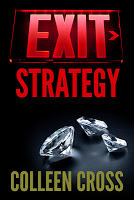 How many passwords do you have? In our electronic age, we all complain about the myriad of passwords we have to keep track of. But are your passwords really unique? Or, like most people, do you use the same one with slight variations?
How many passwords do you have? In our electronic age, we all complain about the myriad of passwords we have to keep track of. But are your passwords really unique? Or, like most people, do you use the same one with slight variations? We all think hacking will never happen to us. But it can happen, and if it does you could lose not only your assets, but your very identity. I've provided some tips below to ensure you're not a victim. In Exit Strategy,Kat Carter uses her password knowledge to stop a fraud and catch the criminal.
If you're dreaming up New Year's resolutions, why not add password-stregthening as one of them? Here are some steps you can take to protect yourself:
1) Use a strong password. This means combining alpha, upper & lower case, numeric and punctuation characters in your password. Yes, it's harder to type and remember, but isn't protecting your identity, financial information and assets worth it? newYear167?! is better than newyear.
2) Don't use common words, or something that could easily be tied to you, such as a family member's name. Here is a list of the 25 most hacked passwords: 25 most-hacked passwords
Is your password one of them? If so, change it right now.
3) Using the same password everywhere. Maybe it's the same with simple variations, such as newyear1 or Newyear, but it's still essentially the same. If one of your passwords is compromised, it's easy for the hacker to guess the others.
Do you have any password horror stories to share? If so, please comment below or drop me an email. I'll talk more about password hacking and identity theft in future posts.
Find out more about fraud and forensic accounting in my debut thriller Exit Strategy available on Amazon, Sony, Barnes & Noble/Nook, Apple and other fine retailers.
Published on December 28, 2011 09:07
December 21, 2011
Exit Strategy & Author Interview
I was recently interviewed on Pat Bertram's wonderful blog. Check out the link below for more background on my writing process and my debut thriller, Exit Strategy:
http://patbertram.wordpress.com/2011/12/13/colleen-cross-author-of-exit-strategy/
I'll be posting more in a few days. Just got back from a wonderful Panama Canal cruise and I'm still getting used to making my own bed, and breakfasts of cold cereal instead of omlettes...
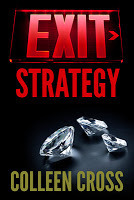 Exit Strategy is available at all major e-book sellers. Download the e-book or a free sample at any e-book retailer, including the links below:
Exit Strategy is available at all major e-book sellers. Download the e-book or a free sample at any e-book retailer, including the links below:Amazon Kindle: http://ow.ly/87aR7
Sony Epub: http://ow.ly/87aUS
Kobo EPub: http://ow.ly/87b5D
Nook EPub: http://ow.ly/87aZx
Apple iBook: Available now on iTunes under Books/Mysteries & Thrillers
Published on December 21, 2011 14:39
December 6, 2011
Write in Scenes
I recently did a guest blog over at the Wredheaded Writer. Dixon Rice's blog has many great tips on writing and creativity. Click on the link below to check out his blog and his writing!
Wredheaded Writer: Tip O'Day #229 - Write in Scenes: Guest blogger Colleen Cross on borrowing a screenwriting technique. Like many writers, I start new books with a general idea, a rough cha...
Published on December 06, 2011 06:00
December 1, 2011
Happy December
 Happy December!
Happy December!I'm working away on Game Theory, book two in the Katerina Carter suspense series. I've painted one of my characters into a corner and can't get unstuck. I've tried all sorts of scenarios. So far none of them work.
Soooo, I've been procrastinating and going through old pictures. No ideas yet, unless I want to work a gardening Santa into the plot.
 My husband shot these photos a few years ago when we visited Santarem, Brazil around Christmas time.
My husband shot these photos a few years ago when we visited Santarem, Brazil around Christmas time. It reminded me of how our perception changes when we see things from different angles. The second picture shows what Santa really looks like (that's me by his foot). Not only is Santa not gardening-he's also much bigger than I thought, and downright scary!
Hmmm, maybe I do have some ideas after all....
Colleen
http://colleencross.com/
Published on December 01, 2011 09:20
November 26, 2011
A Must-Read
 It must be November because the wind and rain have arrived here in Vancouver with a vengance this last week. One big benefit of stormy weather is that it gives me more time to read great books!
It must be November because the wind and rain have arrived here in Vancouver with a vengance this last week. One big benefit of stormy weather is that it gives me more time to read great books! The Angel and the Brown-Eyed Boy is a must-read. The well-drawn characters immediately drew me in, and the vivid descriptions and non-stop action further immersed me in the story.
On one level this is an entertaining escape to a fantasy world. It's Earth, many years in the future. On the surface, life goes smoothly. There are no more wars, and everyone is taken care of. That is, as long as you don't question authority and believe everything you are told. Jeremy and Eliana are from very different worlds. His future-Earth, and her distant utopia may be more similar than they first appear. When a nuclear holocaust approaches, each discovers that the truth may be very different from what they've been told. They face difficult choices--will they be the right ones?
This is an original and captivating story, and author Sandy Nathan's vivid details will transport you into this intriguing world. I loved this book and can't wait to read the next book in the series. Here's a link to the book on Amazon if you want to find out more:Link to Book
Published on November 26, 2011 09:43
November 23, 2011
Escobar, Incorporated
"Everyone has a price, the important thing is to find out what it is."
Those are the words of the late Pablo Escobar, notorious Columbia cartel kingpin and arguably the world's most famous cocaine trafficker. During the 1980's he smuggled in a half-billion dollars worth of cocaine into the U.S. on a daily basis - worth over one hundred and eighty billion dollars a year in income!
I'm doubt anyone will ever find audited financial statements to confirm this, but that's the estimate. This was decades ago, yet it's still double the 2010 income of Microsoft. Organized crime is bigger than you think.
Some other interesting facts:
Rubber bands were used to keep the stacks of money together at a cost of $2,500 a month (they couldn't exactly deposit it in the bank).
Accountants in the Escobar organization had a 70% mortality rate from unnatural causes. I sure hope the pay was good while it lasted.
 The cash had to be hidden away in walls, floors or buried. Ten percent of it was assumed lost due to shrinkage, mostly from mold or rats chewing through it. I don't know about you, but ten percent seems awfully high to me, even for hungry rats. Was there fraud involved? Possibly. It can happen anywhere - even in drug cartels. We'll never really know, but it's food for thought.
The cash had to be hidden away in walls, floors or buried. Ten percent of it was assumed lost due to shrinkage, mostly from mold or rats chewing through it. I don't know about you, but ten percent seems awfully high to me, even for hungry rats. Was there fraud involved? Possibly. It can happen anywhere - even in drug cartels. We'll never really know, but it's food for thought.
Published on November 23, 2011 14:40
November 15, 2011
Blood Diamonds - Blood Cellphones?
Most of us have heard of blood, or conflict diamonds. The Kimberly Process made great strides in certifying conflict-free diamonds, and eliminating blood diamonds. But did you know there are other conflict minerals? I didn't. When I researched conflict diamonds for Exit Strategy, I found a wealth of material. But nothing on coltan, which is used to create tantalum. Tantalum capacitors are used in our cell phones, computers and many other electronics.
 Eighty percent of the world's coltan comes from Africa, mostly from Congo. It is probably the richest country on earth in terms of mineral wealth. So why do most of its people live in terrible poverty? Dismemberment, rape, murder and wide-scale corruption are everyday occurences. The vast mineral riches fuel civil war, and enrich a few at the expense of many.
Eighty percent of the world's coltan comes from Africa, mostly from Congo. It is probably the richest country on earth in terms of mineral wealth. So why do most of its people live in terrible poverty? Dismemberment, rape, murder and wide-scale corruption are everyday occurences. The vast mineral riches fuel civil war, and enrich a few at the expense of many.
Does the maker of your cell phone or computer have a anti-conflict minerals policy? You probably won't be able to find out, at least not yet. Some legislation is in the works in the U.S. and Canada, and likely other countries as well. Should there be a policy, or is that over-regulation? There are arguments on both sides. Manufacturers feel it is impossible to track and certify the origin of their suppliers' materials. The opposing argument is that by fueling the demand for these products, we as consumers are complicit.
The issue is much more complex than what I've mentioned here, but isn't it something we should all find out more about? As consumers, we create demand for these consumer products, so we are also somewhat responsible for the issues and behaviours that result. Each of us can make a difference, albeit small. Even if we can't change the world on our own.
On second thought, maybe we can.
 Eighty percent of the world's coltan comes from Africa, mostly from Congo. It is probably the richest country on earth in terms of mineral wealth. So why do most of its people live in terrible poverty? Dismemberment, rape, murder and wide-scale corruption are everyday occurences. The vast mineral riches fuel civil war, and enrich a few at the expense of many.
Eighty percent of the world's coltan comes from Africa, mostly from Congo. It is probably the richest country on earth in terms of mineral wealth. So why do most of its people live in terrible poverty? Dismemberment, rape, murder and wide-scale corruption are everyday occurences. The vast mineral riches fuel civil war, and enrich a few at the expense of many.Does the maker of your cell phone or computer have a anti-conflict minerals policy? You probably won't be able to find out, at least not yet. Some legislation is in the works in the U.S. and Canada, and likely other countries as well. Should there be a policy, or is that over-regulation? There are arguments on both sides. Manufacturers feel it is impossible to track and certify the origin of their suppliers' materials. The opposing argument is that by fueling the demand for these products, we as consumers are complicit.
The issue is much more complex than what I've mentioned here, but isn't it something we should all find out more about? As consumers, we create demand for these consumer products, so we are also somewhat responsible for the issues and behaviours that result. Each of us can make a difference, albeit small. Even if we can't change the world on our own.
On second thought, maybe we can.
Published on November 15, 2011 06:00
November 11, 2011
Ponzi Schemes - 3 Signs of Imminent Collapse
Today's blog is part two on Ponzi schemes. They're more common than you think.
Ponzi schemes are fictitious investments that pay fraudulent returns to investors, either by returning their own money or the money of new investors, and passing it off as investment return. Typically the perpetrator of the fraud uses the Ponzi scheme to fund his or her lavish lifestyle, and often there is a promise of a very high return in exchange for locking in the investment for a period of time.
Sooner or later all Ponzi schemes will collapse, but often not before leaving many victims. This could be years later if the promoter is successful in continually attracting alot of investment money.
Once you realize these Ponzi schemes are based on nothing but fake returns, you can see that there are several catalysts that will force Ponzi schemes to eventually collapse:
No new investors
No new investors mean no new money is coming in. Eventually the money will run out, and those promised returns will disappear. Investors may get a few payments or many, depending on how many new investors can be suckered in.
Market declines
Market declines often cause investors to get nervous, and may result in redemptions. Depending on the amount of redemptions, there may not be enough money to continue paying the fictitious high returns, since it is really just a return of peoples' investments.
Promoter disappears
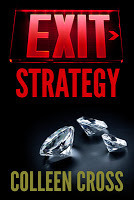 Most of the time he/she disappears with your money too. In many cases, this will be a direct result of #1 and/or #2. Prior to this, he/she may make excuses about family or business emergencies. Their voicemail might be full, and they may not return calls or emails. Even faking their own deaths is not uncommon.
Most of the time he/she disappears with your money too. In many cases, this will be a direct result of #1 and/or #2. Prior to this, he/she may make excuses about family or business emergencies. Their voicemail might be full, and they may not return calls or emails. Even faking their own deaths is not uncommon.
Ponzi artists are typically in it to feed their greed, egos, or both.
Read more about fraud by signing up for my blog at http://www.colleencross.com/ or read Exit Strategy, book 1 in the Katerina Carter suspense series, available in November 2011 on Kindle at http://www.amazon.com/
Colleen Cross
http://www.colleencross.com/
follow me on Twitter @colleenxcross

Ponzi schemes are fictitious investments that pay fraudulent returns to investors, either by returning their own money or the money of new investors, and passing it off as investment return. Typically the perpetrator of the fraud uses the Ponzi scheme to fund his or her lavish lifestyle, and often there is a promise of a very high return in exchange for locking in the investment for a period of time.
Sooner or later all Ponzi schemes will collapse, but often not before leaving many victims. This could be years later if the promoter is successful in continually attracting alot of investment money.
Once you realize these Ponzi schemes are based on nothing but fake returns, you can see that there are several catalysts that will force Ponzi schemes to eventually collapse:
No new investors
No new investors mean no new money is coming in. Eventually the money will run out, and those promised returns will disappear. Investors may get a few payments or many, depending on how many new investors can be suckered in.
Market declines
Market declines often cause investors to get nervous, and may result in redemptions. Depending on the amount of redemptions, there may not be enough money to continue paying the fictitious high returns, since it is really just a return of peoples' investments.
Promoter disappears
 Most of the time he/she disappears with your money too. In many cases, this will be a direct result of #1 and/or #2. Prior to this, he/she may make excuses about family or business emergencies. Their voicemail might be full, and they may not return calls or emails. Even faking their own deaths is not uncommon.
Most of the time he/she disappears with your money too. In many cases, this will be a direct result of #1 and/or #2. Prior to this, he/she may make excuses about family or business emergencies. Their voicemail might be full, and they may not return calls or emails. Even faking their own deaths is not uncommon.Ponzi artists are typically in it to feed their greed, egos, or both.
Read more about fraud by signing up for my blog at http://www.colleencross.com/ or read Exit Strategy, book 1 in the Katerina Carter suspense series, available in November 2011 on Kindle at http://www.amazon.com/
Colleen Cross
http://www.colleencross.com/
follow me on Twitter @colleenxcross
Published on November 11, 2011 06:00



